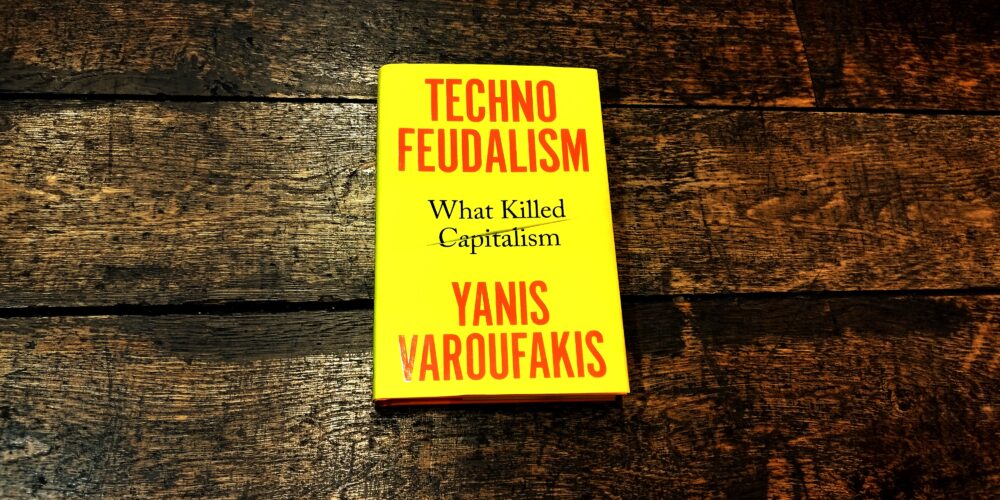The M-C-C’-M’ circuit means Money (M) which is exchanged for Commodities (C) – including labor power which also becomes a commodity in a capitalist society – involved in the production process to produce a value-added commodity (C’) which is sold for more Money (M’), and thus the accumulation of capital takes place.
Yanis Varoufakis’ Techno Feudalism is a thought-provoking book, narrated in a way to answer his father’s question whether modern technologies like the Internet will sustain the capitalist system or expose its weakness. Yanis justifies the terminology Techno Feudalism – instead of hyper-capitalism – to distinguish something that’s qualitatively different from capitalism. Capitalism, which has profit as its motive, he argues, has morphed into “techno feudalism” which is based on rent, similar to feudalism. Rent means privileged access to things which are limited in supply, whereas profit originates from creating things that did not previously exist and, unlike profit, rent is not vulnerable to competition because of their different origins. When profit is replaced by rent, that hinders capitalism’s dynamism and creates bubbles that burst, immersing people and nations into debt traps. The genesis of “techno feudalism” is the privatization of the Internet and the way in which the 2008 crisis was managed. Contrary to the Marxists’ belief that Capitalism will be followed by Socialism, Yanis says capitalism has mutated into “techno feudalism” by which feudalism has made a comeback. Yanis holds the opinion that like a virus that kills its host, capital has destroyed capitalism – in an attempt to save capitalism, the banks printed money which ended up in the hands of cloud capitalists which resulted in “techno feudalism” which killed capitalism.
Capital is produced in a workplace where wage workers are involved in the production process using the means of production to produce commodities and surplus value. Cloud capitalists attract user’s attention, modify their consumer behavior, extract free labor from them as cloud serfs and charge a cloud rent from capitalists to sell their products. In capitalism, profits are reinvested in production, but rent is removed from circulation and stashed in yachts, buying football clubs, crypto-currencies, etc. If rent from the ownership of land was the basis of Feudalism, “techno feudalism” is based on rent from the ownership of privatized Internet. If the funding for factories in early capitalism was by primitive accumulation from African slave labor and colonialism, the cloudalists were financed by the money printed by central banks, expanded by free labor of common people, which intensifies the exploitation of workers and at the same time extracts rents from capitalists.
In 1944, the Bretton Woods system was created to control the reckless bankers who pushed the world to the great depression in 1929 and consequently to a world war. Bretton Woods functioned on the condition that the US will have a trade surplus (the US will export more than it imports) with other countries, so that the dollars will come back to the US. After the dismantling of Bretton Woods, profit ceased to be the fuel that propelled investment and innovation, and central bank money became the propellant
Yanis says “techno feudalism” has adverse effects on labour, as it hates inflation and solves it by suppressing wages, based on the myth that increases in wages cause inflation which Marx debunked in Value, Price and Profit (1865).
A dark deal, or Faustian bargain (a deal with the devil), happened between China and the US to keep Chinese factories busy. In return, China invested its profit in the US (FIRE- finance, insurance, real estate). Europe’s dark deal with the US is also the reason for Europe’s subservience to the US, while every crisis weakens the EU further.
Joe Biden’s chip ban had two unintended consequences: firstly, the Chinese capitalists dependent on export-led production to the US initially reluctant to invest in cloud finance started cloud financing, and secondly the whole world flocked to Chinese cloud finance.
Yanis’ hypothesis is that Europe’s lack of cloud capital will cause her trouble as cloud capital defeats terrestrial capital, absorbing cloud rent out of the global value chain, and will make Europe geostrategically irrelevant.
Revolutionary change in societies means change in the mode of production: if so, is techno feudalism a new mode of production? What does “techno feudalism” produce? Which are the contending classes and what are the contradictions? Is “techno feudalism” only a bubble within the capitalist system? How long can the central banks keep on providing money without investing in production of goods? This book makes capitalism look good and makes us think that capitalists can be an ally in a struggle against techno feudalism. Marx’s law of the tendency of the rate of profit to fall creates a lack of interest in investment in production which causes the diversion of capital towards buying assets, creating bubbles, hence “techno feudalism” is a bubble rather than a change in mode of production, and cloud capitalists are a parasitic class who don’t have any involvement in production.
In the last chapter the alternative to the present mess presented is interesting but lacks novelty: democratizing the workplace, common ownership of land and cloud and bottom-up communism (lessons from failed Soviet experiments), and then ends with a call for an alliance between cloud serfs, cloud proles and vassal capitalists. Can the two classes viz. proletarians and capitalists, with their unresolved contradictions, be on the same side in the fight against “techno feudalism”? Though the book is interesting, it raises more questions than providing answers.
Techno Feudalism by Yanis Varoufakis is available from Connolly Books now
https://www.connollybooks.org/product/techno-feudalism-what-killed-capitalism






